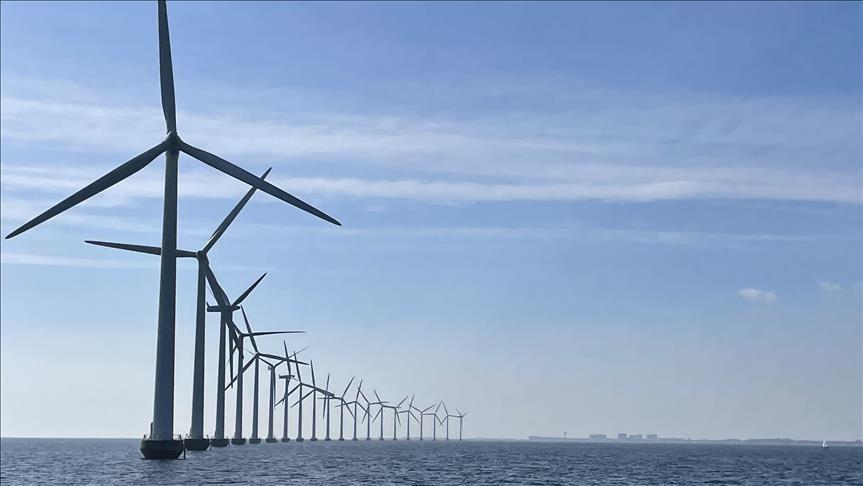US President Donald Trump's rollback of renewable energy subsidies and leasing has rattled confidence in the country's clean energy sector, with experts warning that the policy threatens projects, jobs, and investor trust, especially in Europe.
Since taking office in January, Trump has ordered a moratorium on new offshore wind leases, required the Interior Department sign off for renewable projects on federal land, and signed the One Big Beautiful Bill Act on July 4 that curtailed tax credits for wind, solar and electric vehicles.
Last month, the US Transportation Department canceled $679 million in funding that had been allocated to 12 offshore wind projects nationwide.
The steps mark a sharp reversal from former President Joe Biden's 2022 Inflation Reduction Act, which unleashed record levels of clean energy investment.
Last month Trump declared: "Any State that has built and relied on WINDMILLS and SOLAR for power are seeing RECORD BREAKING INCREASES IN ELECTRICITY AND ENERGY COSTS. THE SCAM OF THE CENTURY! We will not approve wind or farmer destroying solar."
"Obviously, it (Trump's remarks) creates uncertainty, because the US was attractive over the last years for clean energy projects," Thibault Michel, a research fellow at the Paris-based think tank IFRI's Center for Energy and Climate, told Anadolu.
Michel noted that Trump has shifted from skepticism to outright rejection of wind and solar power, deepening concerns about the future of clean energy investment in the US.
- US investment drops 36% in first half of 2025
Wind additions in 2024 slowed to their weakest level in years, with many projects still awaiting final investment decisions when the administration tightened rules.
Denmark's Orsted halted its nearly complete Revolution Wind project in Rhode Island after a federal stop-work order, while US renewable spending fell sharply.
According to BloombergNEF, US investment dropped 36%, or about $20.5 billion, in the first half of 2025 compared with the prior six months.
During the same period, EU-27 investment surged nearly 63%, close to $30 billion.
The American Council on Renewable Energy (ACORE) President and CEO Ray Long blasted the stop-work order.
"The Trump administration's decision to halt the Revolution Wind project off Rhode Island is an extraordinarily damaging mistake," said Long.
He said the project was nearly complete, employing 2,500 people and delivering billions in private investment, and warned that canceling it sends "a chilling signal to investors and developers that the US cannot be relied upon to honor its commitments, even when projects are 80% built."
Long added that the decision risks higher power bills, and undermines US competitiveness as China races ahead with energy infrastructure spending.
While, US Energy Secretary Chris Wright defended the administration's stance, arguing offshore wind is uncompetitive without government support.
"In the 'One Big Beautiful Bill' President Trump advocated, we removed subsidies for wind," Wright told the Financial Times.
"Offshore wind is twice as expensive as onshore wind, and we wouldn't have a big onshore wind industry without a lot of subsidies. The economic outlook for offshore wind in the United States is not promising," he added.
According to Michel, US developers were already strained by high costs and global competition before Trump took office.
"Jobs destroyed in the wind and solar supply chain won't be replaced by oil and gas," he said. "Most studies agree that for the same amount of energy, renewables employ more people than fossil fuels."
"Trump's idea is to create new growth for oil and gas, but US oil production is expected to stabilize, not grow much, according to the Energy Information Administration," he added.
- "Investments in renewables are outpacing fossil fuel"
Electricity demand in the US is climbing, driven in part by the growth of data centers, but generation capacity has increased only modestly over the past decade, almost entirely from wind, solar and battery storage.
"If you withdraw additions from wind, solar, or battery storage, it seems impossible to keep pace with growing demand," Michel said.
He noted that nuclear and gas projects could add supply, but new plants are unlikely to come online before 2028.
Despite this uncertainty, some US states continue expanding renewables, he explained. "The US remains a big market, so it will still be attractive. But these announcements send a misleading signal. No one knows what will happen next."
Globally, however, the picture is much clearer, renewables accounted for 92.5% of new power generation capacity added in 2024, according to the International Renewable Energy Agency.
"Investors around the world support their deployment: investments in renewables are outpacing fossil fuel funding by a substantial margin," Christoph Zipf, a spokesperson for the industry group WindEurope, told Anadolu.
"New wind farms generate electricity at lower costs than new fossil or nuclear power plants," Zipf added.
"The only way to slow down the global growth of renewables [in the power sector] is through policy interventions. Such interventions run counter to economic reason," he said.
By Handan Kazanci
Anadolu Agency
energy@aa.com.tr


